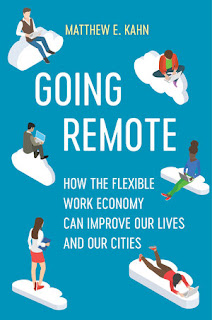 (joint with Mac McComas) and Adapting to Climate Change.
(joint with Mac McComas) and Adapting to Climate Change.
Kahn applied the “Page 99 Test” to his latest book, Going Remote: How the Flexible Work Economy Can Improve Our Lives and Our Cities, and reported the following:
On page 99 of Going Remote, I discuss how the locational choice of startup firms will be affected by the rise of Work from Home (WFH). In our recent past, startups ranging from Facebook to Uber moved to where the "action was" in order to be close to venture capitalists who finance such firms and to be physically close to the types of workers they needed to hire. Startups don't always succeed and this means that young workers have wanted to live in an area featuring many startups such that if one fails, they can move to another startup without having to uproot their lives by moving across the nation.Follow Matthew E. Kahn on Twitter.
As more startups rely on WFH, these firms can even be virtual without having a physical location. This reduces their upfront costs and allows them to hire global talent. Such firms retain the option to open a physical location in the future. The nation's airport system, roads and trains allow such footloose workers to be physically connected to our major technology hubs such as Silicon Valley for face to face meetings.
Page 99 provides a good test for my book because it demonstrates how I think about the consequences of the rise of WFH in our Post-COVID economy. A "silver lining" of the COVID shock is that millions of us have experienced what we gain and lose from Working from Home. In my book, I argue that persistent WFH will change American's economic geography. Every firm and every qualified worker will have to think about the costs and benefits to them of engaging in WFH on at least a part-time basis. On page 99, I explore how startup firms can make the most of WFH. If we hadn't experienced the COVID shock, many startups would have followed the old tried and true method of renting real estate in some commercial building. The leadership of a startup knows what face to face interactions must take place in order for the firm to thrive. Such startups will be more likely to recruit a higher morale, more diverse workforce if the workers have the freedom to work from anywhere.
I do cringe at one typo I see on page 99. The grammar is correct but I used the wrong word and it changes the meaning of a key sentence. Cher has a hit song; "If I Could Turn Back Time." If I could turn back time, I would rewrite my sentence to make the following point. Urban economists cannot run randomized experiments where we randomly assign startups to locate in a Silicon Valley or to Nebraska or to be working from home. Since, we can't run such experiments we must rely on observational data as we observe which firms are productive and where they locate. These spatial patterns do not prove that the firm's location caused the firm to thrive. Why? We will never know the following "what if"; Facebook thrived when it located in Silicon Valley. Would it have been equally effective had it located elsewhere? My typo destroyed my attempt to teach the reader about whether great companies move to great places or do great places make companies great.
The Page 99 Test: Heroes and Cowards.
--Marshal Zeringue



